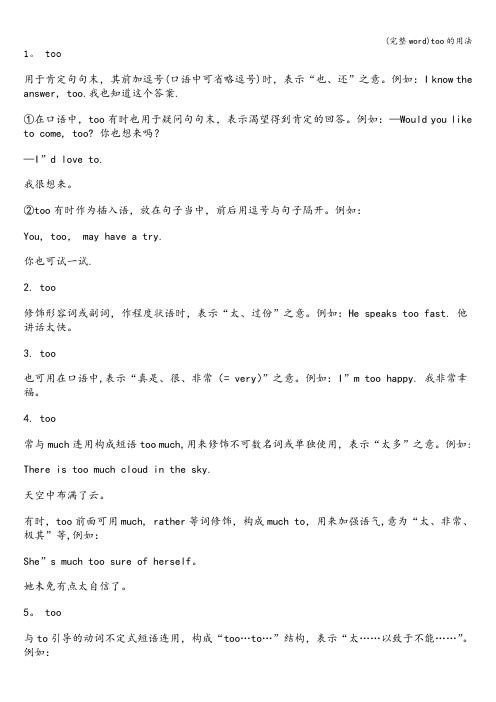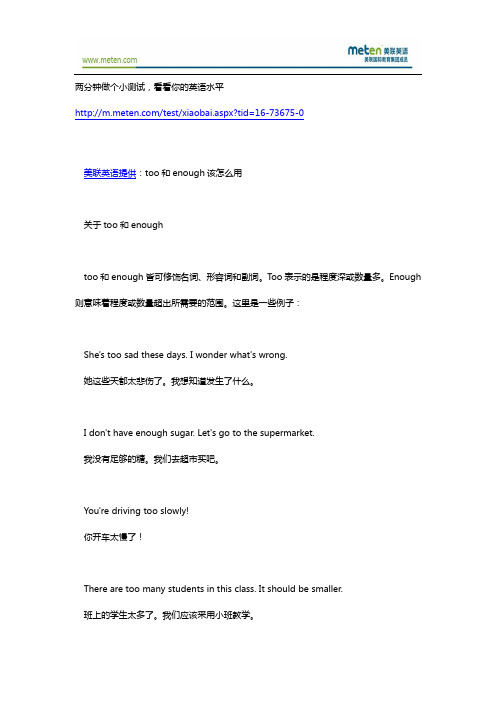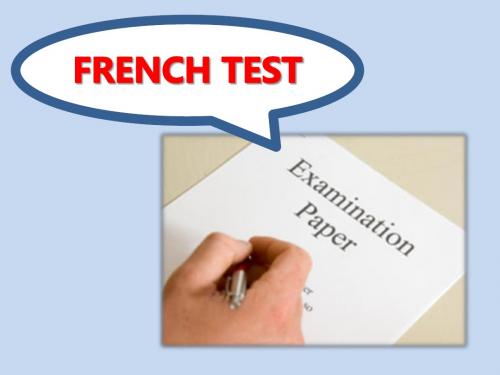(完整版)too__very_enough_的及其用法
- 格式:doc
- 大小:36.51 KB
- 文档页数:3

Enough的用法Enough是初中英语四会词汇,也是中考英语的热点词汇。
现在对enough的用法进行归纳总结,便于同学们的学习。
1.用作名词,意思是“足够,充分”。
I think I have said enough. 我认为我已经说得够多了。
Enough is enough. 适可而止。
Parents always worry about whether their children eat enough. 父母总是担心他们的孩子是否吃的足够多。
2.用作形容词,意思是“足够的,充分的”。
修饰名词时放在名词前面,也可以放在被修饰的名词后面。
常用句式为:enough +名词+ for sb./sth.或者enough+名词+(for sb.)to do. There is enough food for all the people. 这有足够多的食物给所有人。
I have enough time to collect the stamps. 我有足够多的时间收集邮票。
The money is enough for me to buy a gift for my mum. 这些钱足够我给我妈妈买礼物了。
3.用作副词,意思是“足够地,充分地”,放在修饰的形容词、副词之后。
常见句式为:形容词/副词+enough (for sb.) to do sth. 足够做某事。
I don’t know him well enough. 我不够了解他。
He is old enough to go to school. 他已经到了上学的年龄了。
This text is not easy enough for you to understand. 这篇文章对你们来说太难理解了。
使用enough时还需注意以下几点:1.Enough不能与no连用,但可以与not连用。
例如:没有足够的时间去机场了。
正:There is not enough time to get to the airport.误:There is no enough time to get to the airport.2.Enough作形容词时,不能被very修饰,但可以与quite连用。

1。
too用于肯定句句末,其前加逗号(口语中可省略逗号)时,表示“也、还”之意。
例如:I know the answer, too.我也知道这个答案.①在口语中,too有时也用于疑问句句末,表示渴望得到肯定的回答。
例如:—Would you like to come, too? 你也想来吗?—I”d love to.我很想来。
②too有时作为插入语,放在句子当中,前后用逗号与句子隔开。
例如:You, too, may have a try.你也可试一试.2. too修饰形容词或副词,作程度状语时,表示“太、过份”之意。
例如:He speaks too fast. 他讲话太快。
3. too也可用在口语中,表示“真是、很、非常(= very)”之意。
例如:I”m too happy. 我非常幸福。
4. too常与much连用构成短语too much,用来修饰不可数名词或单独使用,表示“太多”之意。
例如:There is too much cloud in the sky.天空中布满了云。
有时,too前面可用much, rather等词修饰,构成much to,用来加强语气,意为“太、非常、极其”等,例如:She”s much too sure of herself。
她未免有点太自信了。
5。
too与to引导的动词不定式短语连用,构成“too…to…”结构,表示“太……以致于不能……”。
例如:I went too late to see him。
我去得太迟以致于没有见到他。

两分钟做个小测试,看看你的英语水平/test/xiaobai.aspx?tid=16-73675-0美联英语提供:too和enough该怎么用关于too和enoughtoo和enough皆可修饰名词、形容词和副词。
Too表示的是程度深或数量多。
Enough 则意味着程度或数量超出所需要的范围。
这里是一些例子:She's too sad these days. I wonder what's wrong.她这些天都太悲伤了。
我想知道发生了什么。
I don't have enough sugar. Let's go to the supermarket.我没有足够的糖。
我们去超市买吧。
You're driving too slowly!你开车太慢了!There are too many students in this class. It should be smaller.班上的学生太多了。
我们应该采用小班教学。
This test is difficult enough already!考试已经够难了!We have too much pollution in the world.我们已经造成太多的污染了。
1.关于enough阅读下面的例子,你会发现,enough有时候位于它所修饰的词语前。
例如:What do we need for dinner? I think we have enough vegetables, don't we? 晚饭还需要准备些什么?我觉得蔬菜已经足够了,不是吗?She feels that Tom has more than enough time to help.她感觉汤姆有足够的时间来帮忙。
在其他的例子中,enough位于它所修饰的词语后面,例如:You should ask John for help he's rich enough to help us all!你应该向约翰求助,他那么有钱,一定可以帮到我们的!I don't think they are smart enough to take that class.我觉得他们的智商不足以应付这门课。


关于enough的用法及解释enough的用法在英语学习中是比较重要的一个知识点,也是许多学生比较容易混淆的知识点之一,接下来小编在这里给大家带来enough的用法及解释,我们一起来看看吧!enough的用法enough adj,足够的,修饰可数名词或不可数名词,可以放在名词前面,也可以放在名词后面;adv,足够地,修饰形容词、副词、动词,并放在其后。
Enough 可当限定词、代名词和副词用,意为「足够(的/地)」,其主要句型为enough for somebody/something、enough to do something 及enough for somebody/something to do something。
Enough 当限定词时后接复数可数名词或不可数名词。
例如:The conference room has enough seats for everyone. (会议室有足够的座位给每个人坐)Enough 当代名词意为「足够;太多」,其后经常接「of + 受格代名词或特指的名词」(所谓特指的名词,就是名词的前面加上the, that, this, these, those或所有格,如my, John's 等等)。
例如:[饭后]A: Have you had enough? (A:吃饱了吗?)B: Yes, thanks. (B:吃饱了,谢谢)enough的相关解释enoughdet.(用于复数或不可数名词前)足够的,充足的,充分的pron.足够;充分;充足adv.足够地;充分地;充足地;相当;尚;十分;很enough的相关扩展adj(形容词)Sufficient to meet a need or satisfy a desire; adequate:充足的:足以满足需要或愿望的;充足的:enough work to keep us all busy.See Synonyms at sufficient 足够多的让我们大家全都忙碌的工作参见 sufficientpron(代词)An adequate number or quantity:数目足够,数量充足:“The Gods above should give,/They have enough and we do poorly live”(Henry David Thoreau) “天上的神祉应该赐予/因他们富足而我们却贫苦度日”(亨利·戴维·索罗)adv(副词)To a satisfactory amount or degree; sufficiently:足够地,充分地:数量或程度上令人满意地;足够地:Is the fish cooked enough?鱼做的火候够吗?Very; fully; quite:很;十分;充分地:We were glad enough to leave.我们很高兴离开 Tolerably; rather:尚可;相当:She sang well enough,but the show was a failure.她演唱得算好的了,但演出却是个失败interj(感叹词)Used to express impatience or exasperation:用以表达不耐烦或恼怒:You've been practicing the violin all afternoon.Enough!你整个下午都在练小提琴.够了!enough的用法例句1、They had enough cash for a one-way ticket他们有足够的钱买单程票。

enough的⽤法怎么⽤enough作形容词时,意为“充⾜的,充分的,⾜够的”,可作表语或定语,作定语时,可放在名词的前⾯或后⾯。
enough作副词时,意为“⾜够地”,这时enough需放在所修饰的形容词或副词后⾯。
enough的⽤法总结⼀、enough可以作名词、代词,意思是"⾜够;充分"。
作代词可以代替可数名词或不可数名词,在句中作主语或宾语。
例句:Enough has been said on this subject.关于这⼀问题说得已经⾜够多的了。
注意:当enough后的名词前有冠词、形容词性物主代词、指⽰代词或其本⾝就是代词时,要⽤介词of。
例句:We've had enough of your coldness.我们已经受够了你的冷漠。
⼆、enough作形容词,意思是"⾜够的;充分的",常与for或不定式连⽤,可以作定语或表语。
作定语置于被修饰的名词前后均可,前置时强调enough,后置时强调被修饰词。
例句:Five men will be quite enough.五个⼈就⾜够了。
三、enough作副词的意思是 "⼗分地;充分地;⾜够地;充⾜地",置于被修饰的形容词或副词之后,常与不定式或介词for连⽤,在句⼦中作状语,表⽰程度。
例句:When they reached the burning building they found that their ladders were not long enough to reach the people who were trapped.当他们靠近烈⽕熊熊的⼤楼时,他们发现梯⼦不够长,够不着那些被⽕围困的⼈。
四、enough作感叹词时意思是"够了;停⽌;住⼿;不要再继续了",⽤以表达不耐烦或恼怒。
例句:You've been practising the violin all afternoon. Enough!你整个下午都在练⼩提琴。
too的用法一、too一般用于肯定句中,常放于句末或作为插入语放在句中,相当于also, as well,表示“也,还”。
例如:I’ll go to work too. 我也要去上班。
She plays the piano, and sings too. 她会弹钢琴,还会唱歌。
He, too, is going to the park. 他也要到公园去。
二、在口语中,有时相当于very,表示“真是,很,非常”;有时还可表示“太,过分”之意。
例如:I’m too happy. 我非常高兴。
I’m not too well. 我不是很舒服。
Don’t drive too fast. 车子不要开得太快。
This coat is too big. 这件大衣太大了。
That’s too much. 那太过分了。
三、too可以用于某些表示肯定的词组后面,表示“而且,还”。
例如:You ought to see a doctor, and quickly too. 你应该去看大夫,而且要快去。
We finished the work quickly and well too. 我们迅速地完成了工作,而且做得很好。
四、too有时没有具体含义,只是为了加强语气。
例如:I will too go!我要去的!五、too不能用于very, fairly和quite后面,但它前面可以用a bit, a little, a lot, rather, much等表示程度的词来修饰。
例如:It’s much too cold, today. 今天天气太冷了。
He’s rather too sure of himself. 他未免有点太自信了。
比较下面的例句:You gave him too much.I’m much too busy.too much意为“太多,太过分”,可以用在不可数名词前,也可用作代词或副词,后面不接名词。
too和very的用法区别
too与very的区别:读音不同、意思不同、用法不同
一、读音不同
1.too读音:英[tuː];美[tuː]
2.very读音:英[ˈveri];美[ˈveri]
二、意思不同
1.too意思:
adv.(用于形容词和副词前)太,过于,过度;也;又;还;(评说某事物使情况更糟)而且
2.very意思:
adv.(置于形容词、副词和限定词前)很,非常,十分,极;(强调形容词最高级或置于own前)完全,十足;完全同样;完全同一
adj.(特指人或事物)正是的,恰好的,同一的;(强调极限的地点或时间)最…的,极端的,十足的;(加强名词的语气)仅仅的,唯独的,甚至于
三、用法不同
1.too用法:
too的基本意思是“也”“还”“而且”,用于肯定句,否定句用either。
too通常位于句末,其前的逗号可有可无,在书面语中,可位于句中,这时其前后一般应有逗号,在美式英语里,too可用于句首,其后必须有逗号。
如果该结构中有两个动词不定式,那么前一个用来修饰形容词,表示肯定意义,后一个用来修饰副词too,表示结果,表否定意义。
2.very用法:
very用作形容词,表示“实在的,真正的”“极端的”,在句中用作定语。
very和the,this,that,my,your,his连用,作“正是,就是,甚至于”解。
very的比较级verier现已不用,最高级形式veriest有时还用来加强语气。
very用作副词主要用于形容词、副词、限定词(如many,few,little 等)前以加强语气,表示“很,非常,十分,极”。
enough的用法和短语例句enough有足够地;充分地;相当等意思,那么你知道enough的用法吗?下面跟着店铺一起来学习一下,希望对大家的学习有所帮助!enough的用法大全:enough的用法1:enough用作副词时,意思是“足够,充分”,一般应放在所修饰的形容词、副词或动词的后面。
enough的用法2:enough还可作“相当地”“还可以地”解,这时在语气上起弱化作用,即语气上比不加enough时为弱。
enough的用法3:enough作形容词时,意思是“足够的,充分的”,在句中多作定语,一般修饰复数名词或不可数名词,可置于所修饰的名词之前,也可置于所修饰的名词之后。
后者属于旧式用法。
enough的用法4:当主语是it或是特定数量时, enough也可用作表语,其后常接for引起的短语或动词不定式。
enough的用法5:enough用于修饰表示坏的品质的名词(如cheek, conceit, impudence)时,一般放在这些词的后面。
enough的常用短语:用作副词 (adv.)curiously〔oddly, strangely〕 enoughsure enough用作名词 (n.)have had enough ofenough的用法例句:1. Three hundred million dollars will be nothing like enough.3亿美元远远不够。
2. The plan is good; the problem is it doesn't go far enough.计划不错;问题在于不够深入。
3. America has enough firepower in the area to mount sustained air strikes.美国在该地区拥有足够的火力发动持续的空中打击。
4. McGregor's effort was enough to edge Johnson out of the top spot.麦格雷戈奋力一搏,成功地将约翰逊从第一的位置上挤了下来。
enough的用法归纳关键信息项:1、 enough 作形容词的用法位置修饰名词的规则例句2、 enough 作副词的用法位置修饰形容词和副词的规则例句3、 enough 与 tooto 结构的转换规则例句4、 enough 的常见短语和搭配列举例句11 enough 作形容词111 位置enough 作形容词时,通常放在名词之前,用来表示“足够的,充足的”。
例如:We have enough time to finish the work (我们有足够的时间完成这项工作。
)There aren't enough chairs for everyone (没有足够的椅子给每个人。
)112 修饰名词的规则enough 修饰名词时,名词可以是可数名词复数或不可数名词。
对于可数名词复数,enough 表示数量上足够。
如:enough books (足够的书)、enough apples (足够的苹果)对于不可数名词,enough 表示量上充足。
如:enough water (足够的水)、enough food (足够的食物)12 enough 作副词121 位置enough 作副词时,要放在形容词或副词之后,用来表示“足够地,充分地”。
The room is big enough (这个房间足够大。
)He runs fast enough (他跑得足够快。
)122 修饰形容词和副词的规则当 enough 修饰形容词时,形容词通常是描述性质或状态的。
如:good enough (足够好)、strong enough (足够强壮)当 enough 修饰副词时,副词通常是描述动作的程度或方式。
如:carefully enough (足够仔细地)、quickly enough (足够快地)13 enough 与 tooto 结构的转换131 规则“enough +形容词/副词+to do sth”结构可以与“too +形容词/副词+to do sth”结构进行转换,但意思相反。
too,very或enough的相关习题
一.完成下列句子,用too,very或enough填空
1.I couldn’t speak to the boss. He was _____ busy.
2.I couldn’t go out. It was ________ cold for me to go out.
3.I could answer all the questions. They were _____ easy.
4.Is that suitcase light ________ for you to carry.
5.Is your brother old _____ to be a member of our association?
6.They couldn’t see that film. They were _____ young.
二.改写同义句,每空一词。
1. The book is interesting enough for everybody to read.
The book is __________ interesting __________ everybody likes to read it.
2. The boy is so short that he can’t reach the buttons of the lift.
The boy is __________ short __________ __________ the buttons of the lift.
The boy isn’t __________ __________ __________ __________ the buttons
of the lift.
三.中考题的例子
1. He is old enough to go to school.
He is __________ __________ that __________ __________ go to school.
2. She was so weak that she couldn’t take care of her baby.
She was __________ weak __________ take care of her baby.
一、so…that与too…to的转换
当that引导的从句为否定式且从句主语与主句的主语相同时,so…that可
转换为too…to结构;若从句主语与主句的主语不相同时,so…that可转换为
too…for sb to结构。例如:
She is so young that she can’t go to school. =She is too young to go to
school.
The box is so heavy that he can’t carry it. =The box is too heavy for him
to carry.
二、so…that与enough to的转换
1. 当that引导的从句为肯定式时,若从句主语与主句主语相同时,so…that
可转换为enough to结构;若从句主语与主句主语不相同时,so…that可转换为
enough for sb to结构。例如:
Xiao Lin is so old that he can go to school. =Xiao Lin is old enough to go
to school.
The box is so light that he can carry it. =The box is light enough for him
to carry.
2. 当that引导的从句为否定式时,若从句主语与主句主语相同时,so…that
可转换为enough to的否定结构;若从句主语与主句主语不相同时,so…that
可转换为enough for sb to的否定结构。同时要注意,转换后的形容词(副词)
要用其相应的反义词。例如:
The man is so old that he can’t go to work. =The man isn’t young enough
to go to work.
The desk is so heavy that I can’t move it. =The desk isn’t light enough for
me to move.
三、enough to的句式为否定式时,enough to可以转换为too…to结构。但转
换后的too…to结构中的形容词(副词)要用其相应的反义词。例如:
He is not old enough to do the work. =He is too young to do the work.
The problem is too difficult for me to work out. = The problem isn’t easy
enough for me to work out.
四.改写同义句,每空一词。
1. The book is interesting enough for everybody to read.
The book is __________ interesting __________ everybody likes to read it.
2. The boy is so short that he can’t reach the buttons of the lift.
The boy is __________ short __________ __________ the buttons of the
lift.
The boy isn’t __________ __________ __________ __________ the
buttons of the lift.
2. enough/too/very
1. I couldn’t speak to the boss. He was ______ busy.
2. I couldn’t go out. It was _______ cold for me to go out.
3. I could answer all the questions. They were _______ easy.
4. Is that suitcase light _______ for you to carry?
5. Is your brother old ________ to be a member of our association?
6. They couldn’t see that film. They were _______ young.
7. The question is easy ___________ for me.
8. These exercises are ________ difficult for him to finish in half an hour.
9. That box is ____ heavy for him to move alone.
10. He is rich _________ to buy that house.
11. She’s clever ______ to solve the difficult problem.
12. Tom is _________ stupid to be able to do it.
13. The distance is short ________ for us to walk.
14. The car was _______ expensive for us to buy.
15. He’s tall _________ to reach that top shelf.
16. It’s ___________ hot to sleep well at night.
17.I love this dress, because it’s _______beautiful.
18.I don’t need books. I have_______ books.
19.Great! You did a______ good job!
20.I eat _______ much today.
21.I failed. That exam was ______ difficult for me.